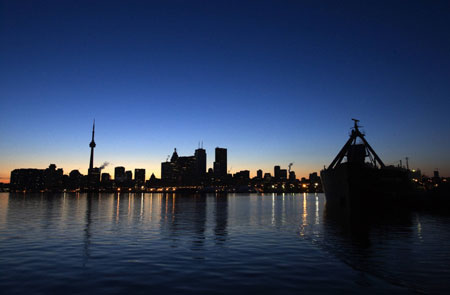|

|
|
This combo of views shows the Sydney Opera House with the lights on and the lights off during "Earth Hour," March 28, 2009. The waters of Sydney Harbour plunged into darkness with the iconic Opera House and Harbour Bridge killing their lights for an hour in a global call for swift action on climate change.[Xinhua/AFP Photo] |
More than a century after American inventor Thomas Edison led the world out of darkness with the first ever man-made electric lamp, people all over the world once again turned their lights off for an hour to help enhance public awareness of environment and give the world a brighter future.
Growing popularity
The event, known as the "Earth Hour," began in Sydney in 2007 when the city turned off its lights to highlight the world's environmental problem. In 2008, the event turned into a global campaign that has drawn the participation of hundreds of towns and cities worldwide.
This year, close to 1 billion people from over 2,000 towns and cities in 84 countries are expected to join the lights-off event on 8:30 pm local time on Saturday. When the 3-year-old event "darkens" more places in the world, it helps bring a brighter future to the planet Earth.
The "Earth Hour" originally aims at arousing the public awareness of energy conservation, and cutting emissions of greenhouse gas and other pollutants, thus minimizing the negative effects of climate change.
It is true that turning off the lights for one hour has very limited effect on climate change, but its significance is more than symbolic, as the event is gaining greater attention and spreading far and wide.
The idea of sustainable development began to take shape since 1962 when American biologist Rachel Carson published his book "Silent Spring." However, until recent decades people remain addicted to massive industrial development, burdening the earth with excessive energy consumption. Just as the theme of this year's "Earth Hour" -- "Vote Earth! Your Light Switch is Your Vote" indicates, the world today needs more than mere sophisticated ideas, it needs concrete and immediate actions.
|

|
|
The Toronto city skyline, normally aglow with lights from office buildings, is seen dark during Earth Hour in Toronto, March 29, 2008.[Xinhua/Reuters File Photo] |
"Walk together"
Tackling climate change has become a major global concern, and numerous negotiations on the issue are underway since the United Nations Conference on Environment and Development (UNCED), or the Earth Summit, held in 1992 in Rio de Janeiro, Brazil.
As a grassroots endeavor joined by people around the world, "Earth Hour" transcend national boundaries and the interests of specific parties. It helped to achieve what international conventions are incapable of doing: people voluntarily commit themselves to do their share to combat climate change.
With mass participation worldwide, the campaign may also serve as a model in the global efforts to face up to other environmental challenges such as water, land and air pollution, vegetation deterioration and species extinction.
As UN Secretary General Ban Ki-moon said in his address on annual lights-off campaign: "We need green growth that benefits all communities. We need sustainable energy for a more climate-friendly, prosperous world. This is the path of the future. We must walk it together."
Remedy for World Economy
This year's event seems to be all the more significant compared with the previous two in view of the worsening economic downturn,
Besides the practical concern about more effective use of energy and further emission reduction in time of crisis, people should be clear that their greater awareness of and better measures for environmental protection will add vigor and vitality to global sustainable development.
As some experts noted, more effective environmental protection measures not only serve as feasible means to tackle climate change, they help create new jobs and encourage a greater number of green innovations, and help relieve the world economy of its current crisis.
(Xinhua News Agency March 29, 2009)